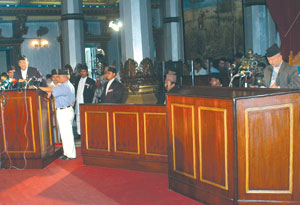|
|
| SOVEREIGN PARLIAMENT: Prime Minister Girija Prasad Koirala (left) speaks briefly before the seven-party declaration is read out by speaker Subhas Nembang. |
May 18, 2006-the day a new Nepal was born. The day the parliament restored by people power declared itself supreme and decided to save the monarchy from a king who nearly took it down with him.
In one razor sharp resolution that can only be described as a 21st century Magna Carta, the parliament cut off powers and privileges enjoyed by kings of
the Shah dynasty for the past 237 years.
Prime Minister Girija Prasad Koirala in a speech to the parliament broadcast live delivered a warning to extremists of the left and right: "The whole nation will rise up against anyone who works against this historic proclamation," Koirala declared before asking Speaker Subash Nembang to continue. As Nembang said, all powers of the king will now be handed to the people, the table thumping from the MPs was deafening.
The declaration was to have been passed by parliament on Monday, but the parties hesitated. There were differences within the parties about the momentous step. A key element of the declaration is the transfer of decisions on royal succession and other palace matters to the parliament's State Affairs Committee. Other provisions include:
. Slashing royal allowances
. Taxing royal income
. Trying royal family members in court in case of criminal offences
. Stripping the king's title as supreme commander of the army
. Replacing the royal household with civil servants
. Abolishing the concept of king-in-parliament
. Delcaring Nepal a secular state
There has been no official reaction from the army but one senior officer told us: "If the nation demands it, this should not be a difficult transition. There will be a few hurdles, and there will be challenges because it is such a big change." Other sources say army chief Pyar Jung Thapa will be replaced by Lt Gen Balananda Sharma who has been recalled from peace-keeping duties in the Golan Heights.
Political analysts say the house declaration paves the way for the country to now deal with the issue of bringing the Maoists in from the jungles. The 12-point agreement is a point to start, but the road is fraught with challenges: a long-term ceasefire, launching a peace process, stopping unprecedented rebel extortion, renunciation of violence by the Maoists, setting up a new interim government made along with the Maoists, demobilisation and integration of the guerrilla army.
The lesson of the past month is clear: Nepali citizens now know their power. They didn't take to the streets just to end royal rule but also to force the Maoists and parties work together to end the conflict.



